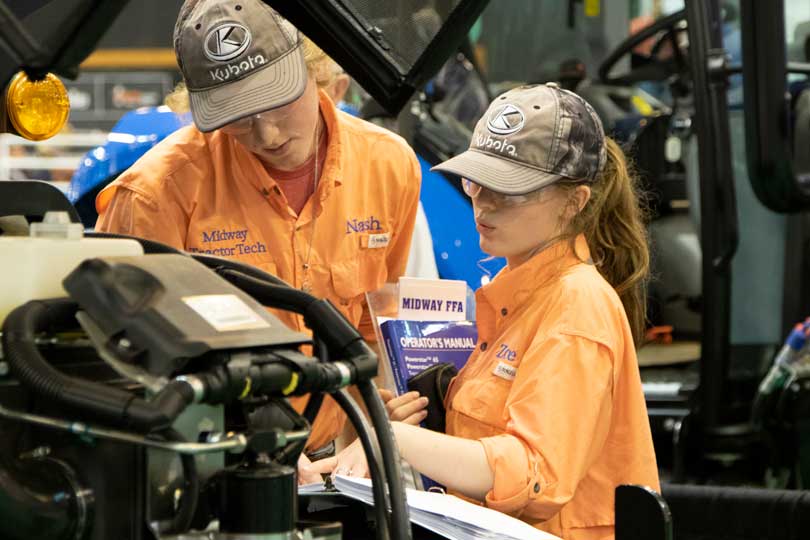By Jennifer Dorsett
Field Editor
“Ladies and gentlemen, start your engines!”
While that wasn’t the announcer’s actual call to action at the FFA Tractor Technician contest, held annually at the Houston Livestock Show & Rodeo (HLSR), it could have been.
Ten teams, composed of three students each, work to locate and correct five deliberately-placed “bugs,” or malfunctions, in a race to get their assigned tractor’s engine started.
“This is unique in that it’s the only FFA-sanctioned tractor technician contest in the U.S.,” Karl Collins, Texas Farm Bureau member and judging coordinator for the HLSR Agriculture Mechanics Committee, said.
The three-part contest culminates in the main arena at the NRG Center, where each team is given a service work order to review and 25 minutes to debug their tractor. Once the engine is started, a team member must drive the tractor around the perimeter of the arena to complete the task.
The Agricultural Mechanics Committee is comprised of individuals employed in the agricultural mechanics industry. They’re responsible for overseeing the FFA Agricultural Technology and Mechanical Systems Career Development Events (CDE) held each year at HLSR.
The committee has hosted the event for more than 30 years. And the contest has only grown since it started, competition supervisor and Tarleton State University professor Curtis Langley said.
“If we go back just a few years to 2010, we only had 20 teams at the state contest. And we probably only had about 40 teams across the state competing in the preliminary area contests,” Langley said. “This year, we had upwards of 90 teams vying for a place at the state contest.”
Langley teaches agricultural mechanics at Tarleton, training future agricultural science teachers for the classroom. He attributes the rise in participation to a renewed interest in workforce education and skilled labor training.
“I think people are interested in being a skilled technician, especially for equipment manufacturing companies,” he said. “They pay well. It’s a really good career. You can earn a good living, and there are plenty of jobs out there. Pair those things together and it’s very attractive to our students.”
Collins, who is an account manager for AGCO Corporation, said over the past couple of decades, a stigma arose against vocational education. But that bias is now being corrected through supply and demand. As workers age out of the workforce, trained replacements have not been entering at the same rate.
“I know, from being in the industry, technicians are desperately needed,” Collins said. “We feel like we’re giving these students a great opportunity. Many of them don’t want to go to a four-year college. They want to stay either close to home or want to start their own business or do something of that nature. So what this program does is help them train and realize what they really want to do.”
Students can go on to trade school or junior college and earn certification as a diesel mechanic or in another related field, Collins said. In only a short period of time, they’ll be trained and ready for employment.
“Everybody’s looking for these types of individuals to come into their dealerships or factories and start working,” he said. “This program trains technicians for the future of agriculture, which we desperately need.”
Judges for the competition are selected from the five manufacturers sponsoring the event—New Holland, Case IH, John Deere, AGCO Corporation and Kubota.
“We get representatives from each one of those companies to come be judges so we have actual professionals doing it,” Collins said. “This is a real-life scenario, something like they might see every day, where a farmer comes in with a complaint about his tractor not working and they have to figure it out.”
In addition to judging the competition, Collins said the industry representatives get a chance to see potential future employees work under pressure and assess their capabilities.
The winners of the competition receive a large haul of prizes donated by the sponsors, including tool sets, tool chests, hydraulic fluids and other related items to further mechanical studies and careers.
“We’re very proud to host this contest,” Collins said. “We’re able to give these students different opportunities through thi

